Hopetown Village, West Coast Berbice is fairly quiet on a normal day, although it is known for holding grand soirees as part of its emancipation celebrations. Most of the residents are engaged in livestock and small-scale cash crop and rice farming, while some of the owners of rice land have rented it to other farmers because of the high cost of production.
A few of the residents operate shops and other small businesses or have jobs at schools, the Fort Wellington Hospital, the Regional Democratic Council (RDC), the Guyana Power & Light branch at Onverwagt and elsewhere.
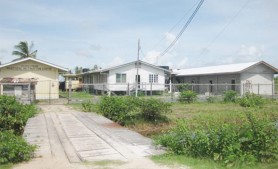
This newspaper caught up with Duncan Joseph who declared that he was the “only shoemaker in the village.” He said he started the trade when he finished high school and was still earning an income from it.
During a mid-morning visit last week, Regional Councillor and member of the People’s National Congress Carol Joseph was happy to share information about the village. Joseph who has been married to Duncan Joseph for the past 20 years explained, “Everybody in the
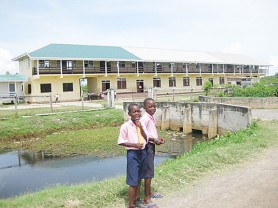
village is related and the relationship is close-knit.”
She said the soiree which is held every year on July 31 with grand African cultural shows and exhibitions attract a number of persons from around the country. The celebration runs into August 1, the day of Emancipation. Many overseas-based residents also return home to celebrate with the villagers and hold family reunions during this time.
According to her, “Sixty per cent of the population in the village is young people and unemployment is a major problem.” Many of the youths have “graduated from high school with several subjects and are home doing nothing. They would like to attend the University of Guyana but are unable to because of financial constraints.”
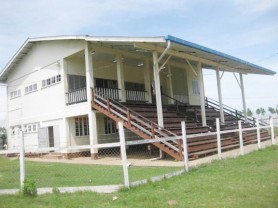
The village has a supermarket, Kash & Karry, that is operated by a few overseas-based residents, and a restaurant, Iwalola, that a retired head teacher is running. A building which housed a disco is now being rented for weddings, wakes and other events.
Practical Instruction Centre
The Hopetown nursery and primary schools are located next to each other in the village, while the Practical Instruction Centre is situated nearby.
The centre has eight teachers along with the headmaster, Hariram Bulkan. It currently operates from two separate buildings, while a third is under construction.
Bulkan told this newspaper that the centre was involved in the six-year Secondary Competency Certificate Programme (SCCP) which started last year for Grade 10 students who were preparing for the Caribbean Secondary Education Certificate (CSEC). This year, however, it included students from Grade 9 as well.
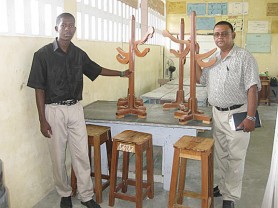
The students who attend Bush Lot, Woodley Park and Fort Wellington Secondary Schools learn metalwork, woodwork, joinery, technical drawing, bricklaying and electricity. Bulkan said the SCCP provided funding for tools, machinery and materials, and the students had used them to build benches and stools as well as coat, towel and shoe racks. They had also repaired all of the tables that were used for technical drawing. He said too that the RDC recently “rewired the workshop to 110 volts.”
Yonette Walters, deputy head teacher of the Home Economics Department told this newspaper that the students were taught visual arts, home management and clothing & textiles. They were learning “catering and are involved in large-scale cooking… This would
prepare them for further studies at the Carnegie School of Home Economics and they can eventually venture into business. This is a prepare them for further studies at the Carnegie School of Home Economics and they can eventually venture into business. This is a stepping-stone for them.”
Both theory and practical sessions are conducted at the centre, but the students sit the exams at their respective schools.
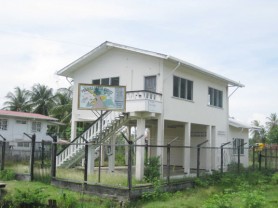
Meanwhile, the teachers pointed out that when it rains, water lodges under one of the buildings which is only a few feet off the ground. They said that it “smells terrible” and that the “region was supposed to do landfilling.”
Recreational Centre
After work and school in the afternoons some residents would turn up at the TT Thompson Recreational Centre, named after the first African Queen’s Counsel for a game of cricket, football, volleyball, basketball or any other sport.
According to Carol Joseph, funding to upgrade the centre and construct a pavilion was provided by the Social Impact Amelioration Programme.
Residents came together and contributed a zinc sheet each and used it to build the fence through self-help. The ground is also open to residents of the immediate environs, Joseph said.
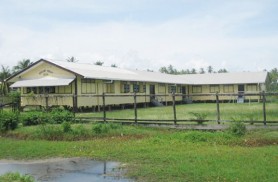
The pavilion is also being rented for academic classes after school and on weekends for children from various schools in the region. Income is generated “to sustain the power supply” through rental for “entertainment purposes from time to time.” She also said that they were in the process of installing meters for events “so people pay for what [electricity] they burn.”
While the government does not contribute to the maintenance of the centre, Joseph pointed out that “whenever we ask the region for assistance we would get it.”
The village also has a Youth Choice building that was acquired through the President’s Youth Choice Initiative. The building was closed for a few months but Joseph said they were in the process of “resuscitating a committee to manage the affairs.
“The first plan on the agenda,” she said, “is to re-open the library which has all types of books. The students who have just finished CSEC [Caribbean Secondary Education Certificate] are cataloguing the books.”
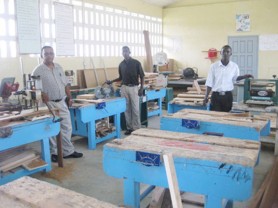
The building is also being used by non-governmental organizations including Comforting Hearts, for training programmes.
The computers that were acquired for the building are currently out of order and Joseph said the Food for the Poor organization would be donating five computers as soon as electricity was restored. The committee would be raising the funds to pay for the power.
Joseph, who is also a member of the central executive committee and regional secretary of the PNC, said she was “working along with the RDC [Regional Democratic Council] to ensure that infrastructural work is carried out in various villages.”
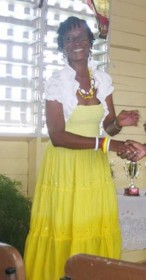
She said it was a “hard task” but there was “some co-operation [by regional officials] and we are getting things done. I enjoy serving; it was always my desire to work with people.”
She is also manager of the Hopetown United Cricket Club which she said was the only team in West Berbice to make it to the NBS 40-overs quarter final.
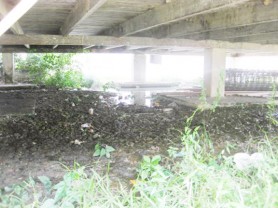
Joseph who graduated with a degree in sociology from the University of Guyana is also a mother of three and a grandmother of three.
History
In sharing some of the history of Hopetown, she said the village was bought by Africans after emancipation and that TT Thompson was responsible for setting out the lots for ownership.
The original name of the village was Perseverance, but at the time that it was being laid out the then governor passed and commented that “this place is hoping to be a town,” and residents decided to rename it ‘Hopetown.’
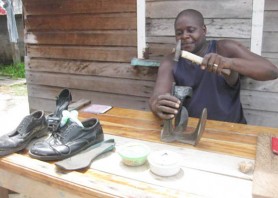
Joseph said each house lot “has a cultivation plot attached to it and most people have planted coconut trees on their plots. Some have also “planted cash crops in between…”
The village also has a “burial ground where plots have been allocated to families to bury their loves ones and they do not have to pay.”
She declared proudly that Hopetown “produced a lot of great people” such as the late Morris Haniff, a lawyer and regional chairman of Region Six; Hilbert Homer, a magistrate: and Matthew Allen, the late broadcaster.
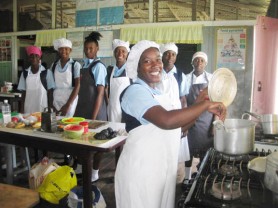
She also mentioned the names of other persons who are still around including Asquith Hamilton, an engineer; Melissa Robertson, land court judge; and Michael Parris, Dean of the Faculty of Social Sciences at the University of Guyana.




